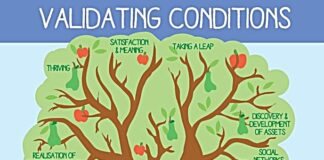Tag: peer support
Here’s Why I Wouldn’t Use the Mental Health System
In this piece for The Spinoff, Graham Panther, a consultant in Australia's mental health system, speaks to some of the shortcomings of mainstream mental health support....
The Downfall of Peer Support: Are You Kidding Me?
In April of this year, Sera Davidow authored a blog titled “The Downfall of Peer Support: MHA & National Certification.” I do not agree with much of what she says in her blog, and as the vice president of Peer Advocacy, Supports and Services at Mental Health America I'd like to respond.
The Strange, Contagious History of Bulimia
In this piece for Science of Us, Lee Daniel Kravetz discusses the impact of media exposure on the rise of bulimia and explores the social...
In Texas, People With Mental Illness Find Work Helping Peers
From Kaiser Health News: Peer support for people diagnosed with serious mental illness is becoming increasingly common. In places like Texas, where there is a...
How to Really Help LGBT Teens Thrive
From The Atlantic: Although acceptance of LGBT individuals is growing, LGBT teens still on average experience lower life satisfaction and more depression than their straight peers,...
United Nations Report Calls for Revolution in Mental Health Care
In a new report, the United Nations Special Rapporteur on the right to health, Dr. Dainius Pūras, calls for a move away from the biomedical model and “excessive use of psychotropic medicines.”
Life Experience is Key for Certified Peer Support Specialists
From MinnPost: Peer support specialists can play a crucial role in helping people recover from life challenges including addiction, mental health concerns, and homelessness.
"'Certified peer...
The Downfall of Peer Support: MHA & National Certification
Mental Health America (MHA) has finally unveiled its new National Peer Specialist Certification over much protest. It is dangerous to what we call ‘peer support’ for MHA to have done this. Even if they did it well. Which, as best as I can tell, they did not.
Christopher: A Transformational Journey from Psychiatric Hospital To Working In Peer...
Christopher describes his transformational journey starting with a very difficult childhood which led him to be treated for many years with various psychiatric medications. After successfully withdrawing, he now works a Program Manager for Heart & Soul inc in California, an organisation which offers a variety of mental health recovery-oriented and wellness support opportunities.
Beyond Survival
Recently I came across a remarkable article, "From surviving to thriving: how does that happen." The authors have demonstrated that when people are weighed down by life's adversities, what they need is authentic, validating support, not facile pathologizing checklists, and not tranquilizing or stimulant drugs.
Preventing Suicide in the UK – a Policy and Practice Divide
The Place of Calm’s innovative Peer Support Approach means suicidal people can stay up to 24 hours in a safe place in the community and receive practical and emotional support from trained professionals who have their own lived experience of mental health challenges. Evidence suggests that it saves lives and is cost effective. Yet its funding is now due to be cut.
Do We Really Need Mental Health Professionals?
Professionals across the Western world, from a range of disciplines, earn their livings by offering services to reduce the misery and suffering of the people who seek their help. Do these paid helpers represent a fundamental force for healing, facilitating the recovery journeys of people with mental health problems, or are they a substantial part of the problem by maintaining our modestly effective and often damaging system?
Our Day in Mental Health Court
For weeks I had been trying to get released from the psychiatric ward, and none of my arguments, compliance, or attempted air of normality had made an impression on the barely-visible ward psychiatrist. I had, I was told, made a very serious suicide attempt and this was a predictor of future attempts. They would let me know when they thought I was sufficiently remorseful and stabilized to be released.
Support for SB 614 with Amendment to Supervision Qualifications
Throughout California, the nation, and the world, peer specialists provide services to individuals with mental health challenges. In California, over 6,000 peer specialists are employed. In 2007, the Centers for Medicare & Medicaid Services guided states to create peer certifications. Since then, more than 30 states have created statewide peer certifications, and if Senator Leno’s Senate Bill 614 goes through, so will California
“Mental Health Bill Caters to Big Pharma and Would Expand Coercive...
Oryx Cohen at TruthOut explains why the "Helping Families in Mental Health Crisis Act (HR 2646) - commonly known as the 'Murphy Bill' - appears to cater more closely to the desires of pharmaceutical companies than to the actual needs of people in psychological distress, perhaps because of Murphy's connections to key lobbyists." "If the Murphy Bill is passed, psychiatric hospitals and pharmaceutical companies will reap huge financial benefits as a result of increased hospitalization and forced treatment."
“Can Madness Save the World?”
Writing for CounterPunch, Paris Williams writes that when an individual is experiencing what has been termed “psychosis,” it is important to recognize that this may also be the manifestation of a breakdown in their larger social groups, the family, society, and even the species.
Destination, Dignity: Creating the Future We Want
As I look back on the civil rights movement and all that my ancestors marched for, I sometimes feel as if the civil rights movement has been a dream deferred. We have come far but still have a long road ahead. The intersection of civil rights, poverty and the psychiatric survivors movement has played out now for four generations. Now the psychiatric movement faces its biggest hurdle. We are asking our allies, representatives and members of our community to stand up. We urge you not to endorse the Murphy Bill.
From Independent to Institutionalized
Dutch peer support education has changed dramatically over time since its inception. Peer support education has evolved over time from empowered and independent peer support education to institutionalized peer support education. In effect the (future) peer support workers in the Netherlands could become clinician-friendly peer support workers who merely represent peer support work in name but not in practice.
Is This Depression? Or Melancholy? Or…
We live in a culture bombarded by media and sped up by rapid-fire social interactions. It's definitely useful to grab hold of a simple, short, sound-bite term, to quickly describe what we are feeling or suffering. "Depression" is such a word - it evokes and encapsulates, conjures the images of that ugly pit of despair that can drive so many to madness and suicide. Yet at the same time the words we use, strangely, become like those pens deposited in medical offices and waiting rooms around the world: ready at hand, easily found, familiar -- and tied to associations, marketing and meanings we were only dimly aware were shaping how we think.
Tim Murphy Mental Health Bill: More Expensive and Less Effective
Here is a short review of the Tim Murphy mental health bill. I show the research that was left out when the bill was written, how advocates can approach the issue, and what the main problem with ignoring the research will be.
How Do You Live at the Intersection of Love and Outrage?
The primary lesson of the mental health civil rights community is that we have to learn to lean on each other to get though adversity, which means opening up and admitting when things aren't moving in a direction we want or expected or try to typically project publicly. We have to ask for help. Here's what I'm chewing on or what's chewing on me.
5 Things You Can Do In 5 Minutes to UnDiagnose Emotional...
A lot of posts on this site are about the problems in mental health care. This post is about some solutions. Many of us can do small, simple things to move advocacy forward. We can all make a difference so people can learn how to handle emotional distress without using disease based approaches with chemically based "solutions." Here are 5 things you can do in the next five minutes to promote UnDiagnosing Emotional Distress.





















